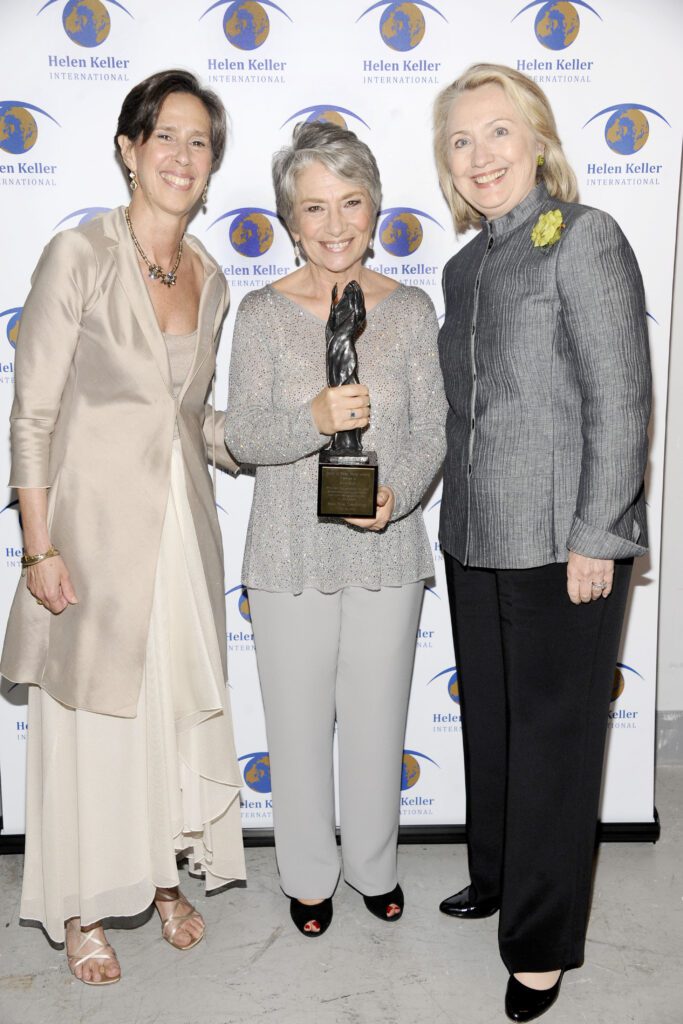Understanding What We Do
Excerpted from Kate Ganz’s acceptance speech upon receiving the 2013 Spirit of Helen Keller Award.
When I thought about what I wanted to talk about this evening I kept remembering one day, one afternoon, one visit that I made to an impoverished village in Niger, and what happened to me that afternoon. I’ve been on many trips, I’ve seen some extraordinary things, but my memory of that particular day kept coming back to me and I thought that I would like to share it with you.
We traveled several hours from the capital of Niger, Niamey, to the southwestern province Téra, which is a very impoverished and desperate place. We had a meeting with a small village and our project there was to begin a community effort to provide iron folic acid for pregnant and lactating women. It’s a supplement that boosts red blood cells and prevents very anemic women from dying during childbirth, or miscarrying, and it was the beginning of a small project which I’m happy to say has grown, as many of our projects do, into something much bigger, and has been very successful. But this was the first village and perhaps because it was my first time in Sub-Saharan Africa, perhaps because it was the first day, it left such an indelible impression on me.
I sat on the ground surrounded by the villagers and was sitting next to a woman who was nursing a small child. She had another infant strapped to her back, and a small girl of perhaps 3 or 4 years old was sort of circling around her and fiddling with her mother’s hair, and just holding on to her a little bit. I asked her how old her daughter was and she said that she didn’t know. So I asked her when her birthday was, thinking that maybe if she remembered when her birthday was she could remember how old she was, and she said she didn’t remember when her birthday was. She did remember she was born after the rains, so it had probably been in the summer.

And I thought to myself – I wonder what this woman, and what the women in this village who are sitting around us, worry about for their children; and what they dream about for their children, what they want for their children? What are the things they think about? Do they worry that their children might not have shoes to walk to school? Do they worry that when they get to school perhaps there won’t be any benches, or any desks, and they might have to sit on a cold floor for the day? Do they worry that there are not enough teachers in the school for every classroom, or that perhaps there won’t be any books? Do they even think that perhaps a child might learn to read, and might one day leave that village? Can they conceive that a child could leave that village, go down this dusty road and have a different kind of life?
And I realized, as I sat there, that they did not worry about those things; they didn’t worry about books, benches and desks and teachers because there wasn’t any school. And when I thought about whether or not they worried about whether their child might need a doctor, or need some medicine, I realized that the nearest clinic was two days walk away; and there wasn’t any medicine in the village, and there wasn’t any clinic. And it came to me, that afternoon, that what they’re worried about was whether or not all of their children would be alive the next morning. And whether they’d be alive the next week, the next season, or the next year.
The statistics for Sub-Saharan Africa are devastating. At that time in 2001 – I think it’s improved fairly dramatically since then – 250 out of every 1,000 children born didn’t live to see their 5th birthdays.
Helen Keller [International] is an organization that persuades their board members to get to the field as often as possible and I think this is a great, great gift to all of us; because it isn’t really until you have sat in a village, or on a bench in a clinic, or in a hospital, for a child dying of malnutrition, or dying of AIDS, that you really understand what it is that we do. And for me it’s been an enormous gift to be on the Board; it’s been a huge privilege, and I feel as though whatever it is that I’ve been able to give to Helen Keller, they have given back to me a thousand times. I will be very proud and happy to have this on my desk to remind me of the spirit of Helen Keller.









